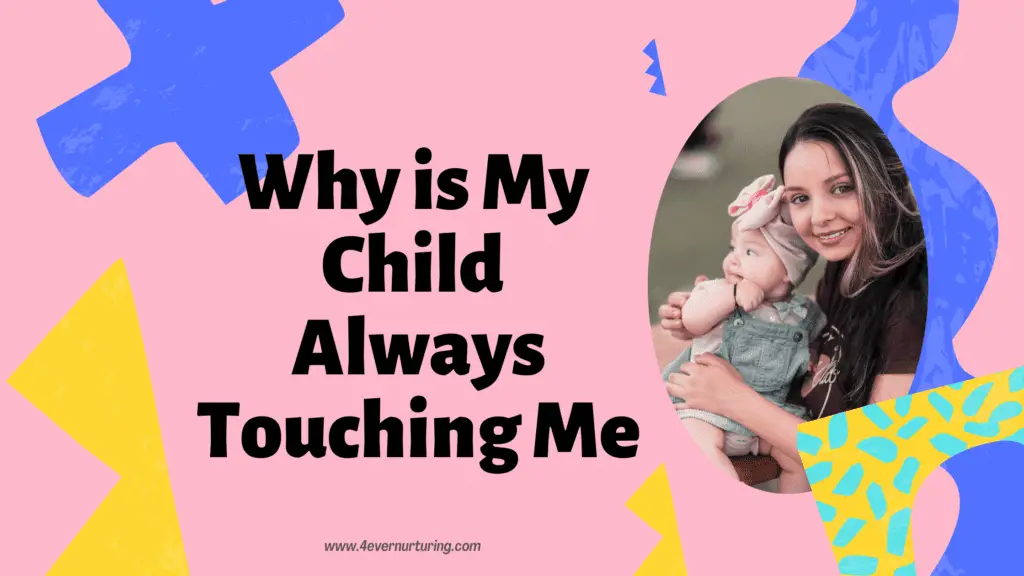Part of child development is touching and sensing things. Asking why my child is always touching me? is a question that can be answered by a simple answer: they are children they have to feel you as they grow. Personality may be different but the development process in children is the same it’s only that environments, especially the social environment impact them.
Children are innocent beings who do not know what is right or wrong and copy what people do. So if your child is touching you, it’s probably because they see people touch each other. Do not see it as a sign of bad parent-child relationship.
There are various reasons why a child would keep on touching someone, especially close people.
1. Connection with Them
Children connect with people through touching. They are not able to speak, mostly infants and toddlers. It is by touching people that they can create a connection or rather a bond. This is something that comes naturally, especially in infants. They would keep on touching whoever hold them. Even when suckling, they tend to touch their mothers, if not their faces (chin) then it’s their breast area.
2. A Way to Understand You
Children touching behavior has been perceived as a means of understanding an individual. In the same way, a visually impaired individual has to touch faces and things to understand them. Children and blind people are no different in trying to understand the formation of something.

3. To Feel Safe
The feeling of safety can make children to keep on touching you. At times, they might be unable to explain it. Although infants and toddlers do not understand what danger is, at times they sense it. It’s after sensing it that they might hold you tight, scream, or start crying. They might be unable to explain it, but they can react. So, when you ask why is my child always touching me? consider this possibility and make sure they feel safe.
4. Comfort
Everyone regardless of age needs to feel comfortable. When a child is not at ease, or something is troubling them, expect them to keep on touching you. They might not express it through words but they will perfectly express it through actions. The feeling of comfort is powerful and at times even an adult needs to do or go somewhere their heart desires since they will be comfortable there. It’s also because of comfort a person would want to live in a spacious room or own a luxury car. Children, mainly toddlers’ love sensations that they are familiar with hence they will repeatedly keep on touching you.
5. Lack of Self-Confidence
This is yet another reason why your child might be touching you always. Children might lack self-confidence especially if they have not been taught to believe in themselves and their abilities. At times, children need their parents close to them so that they can be able to face any situation; mostly by hiding behind their parents’ backs. When their parents a within, they are confident because their “shield” is not far. The social environment and parents’ tolerance of this and not teaching their children how to be self-confident exacerbates the situation.
6. Assert Dominance
Toddlers and children in general love their parents. When another a child, even a sibling holds on to their parents and tells them that they are no longer their parent, a child might burst into tears. A child touching you always is a sign of dominance. They want others to know that you are their parent or guardian and no one can take you away from them. Another perspective of this is their wanting to control you. Although this is not common, it does occur. A child would keep on touching you as a way to nag. Bit by bit, they get to control you and eventually do what they desire.
7. Express Love and Affection
There are multiple ways in which children express love and touching a person is one of them. They might not have the words to do so but the way they touch you expresses everything. This is why it’s important to get to know your child and be aware of what he or she needs by observing their behaviors.

8. Seek Attention
The way children seek attention is not that much different from that of grown-ups. When they need attention, they know touching you works magic that is why they would not hesitate to do it. Although children need different types of attention, the manner in which they touch you to inform you is the same. They are not intelligent to keep on changing their touching patterns even if they are growing.
So, when a child touches you repeatedly, give them your attention even if it is for five minutes, and get to know what they want to communicate.
9. Do Not Know Anything About Personal Space
Personal space is important and children from a tender age need to know this. Unless they are not informed about it, children will end up not being aware and probably know it when it’s late and they have messed up something(s).
So when you ask, why is my child always touching me? ask yourself again if they are aware of personal space and the consequences of invading such spaces.
How to deal with Children’s Touching behaviors
A child touching you should not be a concern but doing it repetitively or excessively, it should be. Although a child’s touching behavior can be tolerated, it should not be when they reach the age of five. At this time, they can communicate hence a parent should create boundaries and inform their child to respect them and communicate if there is an issue. Even when a child is not of this age, it’s also important to communicate with them while keeping your tone in check.
By doing this, they get to understand that everyone is the boss of their body and it is not okay to touch someone without their permission. Instilling such lessons in a child changes a lot and helps to keep their hands off other people. Let them understand what personal space is and the reason why it should not be invaded.
Let them know they have to ask a person permission to touch, hung, or kiss them as this shows respect; which is very important. Get to understand the perceptive of a child’s touching behavior and model it accordingly. If they are do not follow you teaching, teach obedience first.







